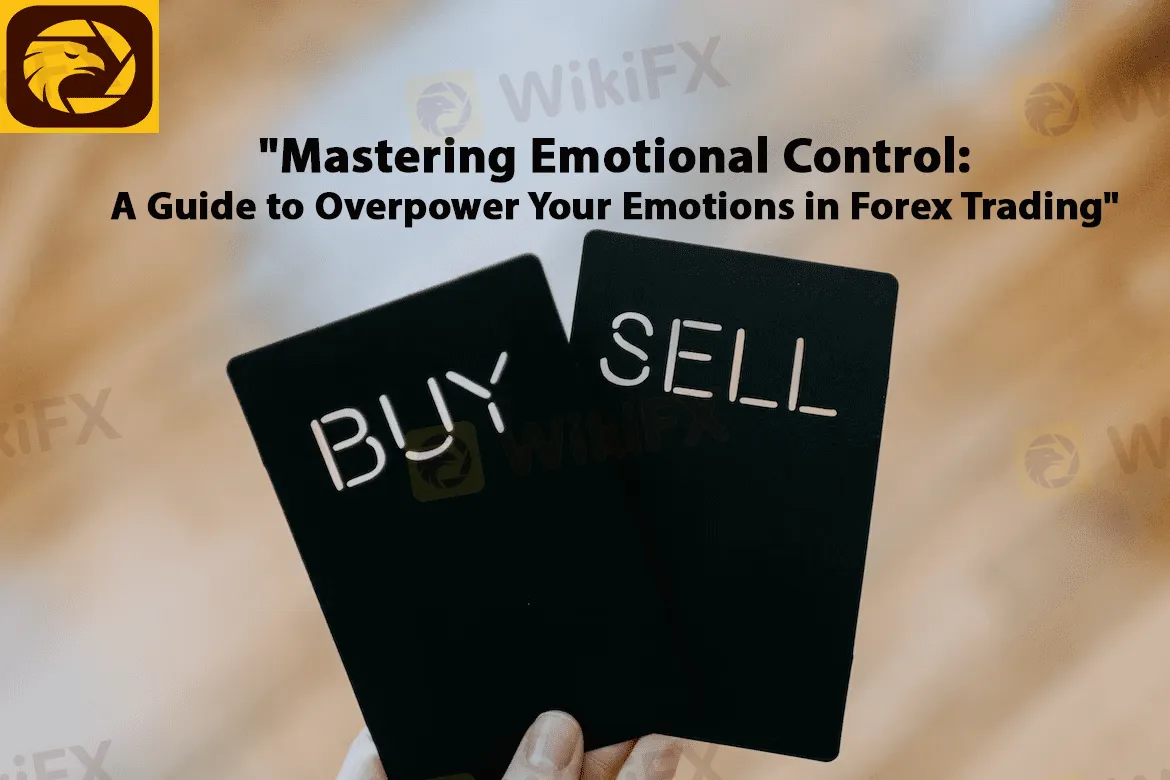"Mastering Emotional Control: A Guide to Overpower Your Emotions in Forex Trading"
Abstract:Forex trading can be an exhilarating and potentially profitable endeavor. However, the volatile nature of the markets often triggers intense emotions that can cloud judgment and lead to costly mistakes.

Mastering emotional control is a vital skill for any forex trader seeking consistent success. In this article, we will explore effective strategies and techniques to overpower your emotions and make rational decisions in the face of market fluctuations.
Recognize the Role of Emotions:
Understanding that emotions play a significant role in trading is the first step towards gaining control over them. Recognize the common emotions that arise during trading, such as fear, greed, excitement, and frustration. Acknowledge that emotions can cloud your judgment and lead to impulsive actions. By being aware of your emotional state, you can actively work towards managing and channeling those emotions in a constructive manner.
Cultivate a Trading Plan:
Having a well-defined trading plan is essential for emotional control. A trading plan outlines your strategies, risk tolerance, and entry/exit rules. It provides a structured framework that helps you stay focused and make objective decisions based on pre-determined criteria rather than succumbing to impulsive emotions. Stick to your plan, as deviating from it due to emotional reactions can jeopardize your trading performance.
Embrace Risk Management:
Implementing effective risk management strategies is crucial for emotional control in forex trading. Set appropriate stop-loss orders to limit potential losses and protect your capital. Determine your risk tolerance and never risk more than you can afford to lose. Proper risk management not only safeguards your funds but also helps alleviate anxiety and fear associated with potential losses.
Maintain a Healthy Mindset:
Developing a positive and resilient mindset is essential for overcoming emotional challenges in forex trading. Understand that losses are a part of trading and view them as learning experiences rather than personal failures. Embrace a growth mindset that focuses on continuous learning and improvement. Practice self-care, including exercise, meditation, and maintaining a healthy work-life balance, to keep your mind clear and focused.
Utilize Trading Journals:
Keeping a trading journal is an invaluable tool for managing emotions. Regularly document your trades, including the reasons behind your decisions and the emotions you experienced during each trade. Analyze your journal periodically to identify patterns and triggers that influence your emotions. By reflecting on past experiences, you can develop strategies to better handle similar situations in the future and gradually gain control over your emotional responses.
Seek Support and Education:
Engaging with fellow traders and seeking educational resources can provide valuable support in managing emotions. Join trading communities or forums where you can interact with like-minded individuals, share experiences, and gain insights. Attend webinars or seminars on emotional intelligence and trading psychology to enhance your understanding of emotional control. Learning from experienced traders and professionals can help you develop effective strategies to overpower your emotions.
Conclusion:
Overpowering emotions in forex trading is a continuous process that requires self-awareness, discipline, and practice. By recognizing the role emotions play in your trading decisions, following a well-defined trading plan, implementing risk management strategies, maintaining a healthy mindset, utilizing trading journals, and seeking support and education, you can gain control over your emotions and make objective decisions. Remember, emotional control is a skill that can be honed over time, leading to improved trading performance and greater success in the forex markets.

Disclaimer:
The views in this article only represent the author's personal views, and do not constitute investment advice on this platform. This platform does not guarantee the accuracy, completeness and timeliness of the information in the article, and will not be liable for any loss caused by the use of or reliance on the information in the article.
Read more

Investor Scammed as Orfinex Withholds Funds and Negligently Trades Accounts
In a distressing turn of events, Mr. Ninonuevo, a 54-year-old investor from the Philippines, finds himself embroiled in a financial quagmire after transferring his accounts from Vllado to Orfinex, only to face rejection of Know Your Customer (KYC) procedures and subsequent withholding of funds by the latter. This alarming revelation has left Mr. Ninonuevo and other members of Intersphere Enterprises (ISE) in a precarious position, unable to access their transferred funds as initially promised by Orfinex.

The Funded Trader: Relaunch or Closure?
After a puzzling hiatus, prop trading giant The Funded Trader resurfaces with cryptic signs of a potential relaunch, amidst mounting user concerns and a cloud of uncertainty.

Binance Secures Key License in Dubai's Crypto Hub
Binance, the world's leading exchange, secures a pivotal license in Dubai's cryptocurrency landscape, shaping the future of regulation.

Hedge Funds Boost Gold Investments Amid Inflation Surge
Explore how hedge funds increase gold investments as inflation rises, with prices reaching record highs and predictions exceeding $2,600 by 2025.
WikiFX Broker
Latest News
CySEC withdraws license of Forex broker AAA Trade
Finalto Elevates OTC Trading With FSCA-Approved Liquidity
Ringgit Weakens Amidst Battling Global Economic Turmoil
WikiFX Broker Assessment Series | Oroku Edge: Is It Trustworthy?
DESPITE A SHARP FALL IN FX, FOOD COSTS CONTINUE TO RISE.
Complaint against Capitalix
Binance Elevates Dubai's Crypto Status with Full VASP License
eToro Added 509 Fresh Stocks and ETFs
Webull Canada Unveils Desktop Trading Platform
MetroTrade Now NFA Member & CFTC Introducing Broker
Currency Calculator


